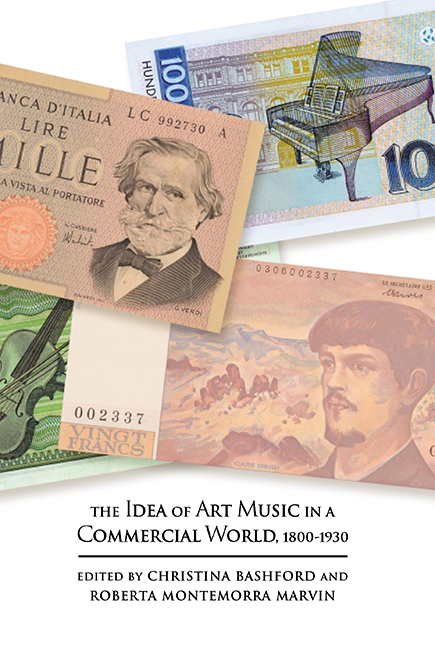Book contents
- Frontmatter
- Contents
- List of Figures
- List of Tables
- Notes on Contributors
- Acknowledgements
- A Note on Translations
- Bibliographic Abbreviations
- Introduction: The Idea of Art Music in a Commercial World
- PART I PUBLISHERS
- PART II PERSONALITIES
- PART III INSTRUMENTS
- PART IV REPERTOIRES
- PART V SETTINGS
- Index
- Music in Society and Culture
13 - ‘Disguised Publicity’ and the Performativity of Taste: Musical Scores in French Magazines and Newspapers of the Belle Époque
Published online by Cambridge University Press: 27 May 2021
- Frontmatter
- Contents
- List of Figures
- List of Tables
- Notes on Contributors
- Acknowledgements
- A Note on Translations
- Bibliographic Abbreviations
- Introduction: The Idea of Art Music in a Commercial World
- PART I PUBLISHERS
- PART II PERSONALITIES
- PART III INSTRUMENTS
- PART IV REPERTOIRES
- PART V SETTINGS
- Index
- Music in Society and Culture
Summary
‘In France democracy is the daughter of publicity.’
John Fred Jones (1905)‘You can tell the ideals of a nation by its advertising.’
Norman Douglas (1917)MUSICAL scores document a composer's creativity, instruct performers how to turn notation into sound, and communicate values. In the commercial world, publishers aspire for them to become collectible commodities protected by copyright, representations of music producing their own knowledge and power. For this, they must first function as signs. When fragments of larger works, musical scores call to mind the whole from which they are drawn. They can also refer back to previous experiences, real or imagined, inducing the pleasure of memory, as with piano-vocal transcriptions that recall opera performances. For scores that promise future experiences, such signs, as in advertising, point to the merits of something that one might not know without them. In late-nineteenthcentury France, a good deal of advertising was ‘disguised publicity’ – items in the news section and even paid articles ‘which seem to appertain to the field of general information more than to advertising’. As the founder of the largest advertising company in nineteenth-century France once put it, the ‘aesthetics, gracefulness, and precision’ of French advertising
has positively transformed the national manners, the social conditions, and the ways of living. […] The one cent press has sowed everywhere the germs of new ideas penetrating to the very depth of the most distant villages, in an atmosphere hitherto unknown of intellectuality, eminently propitious to national progress in every conceivable shape and form.
In this essay, I examine the scores published in French magazines and newspapers from the 1870s to the 1920s, their weekly supplements and their annual albums for subscribers, as well as the choices and marketing strategies underlying them. These scores provided broad access to the gamut of French musical culture, from opera and operetta to piano pieces and popular song. But when the frame is a newspaper or magazine, what does a score mean? How is the medium part of the message? Musical scores in the press, like French advertising, were a technology, a medium and a practice that, in addressing specific needs, desires and objectives, created an exchange satisfying both producers and consumers.
- Type
- Chapter
- Information
- The Idea of Art Music in a Commercial World, 1800-1930 , pp. 297 - 326Publisher: Boydell & BrewerPrint publication year: 2016



